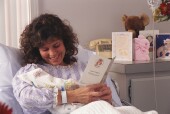- The Best Time of Day to Drink Bone Broth to Maximize Health Benefits
- 8 Ways to Increase Dopamine Naturally
- 7 Best Breads for Maintaining Stable Blood Sugar
- Gelatin vs. Collagen: Which is Best for Skin, Nails, and Joints?
- The Long-Term Effects of Daily Turmeric Supplements on Liver Health
- Could Your Grocery Store Meat Be Causing Recurring UTIs?
- Are You Making This Expensive Thermostat Error This Winter?
- Recognizing the Signs of Hypothyroidism
- 10 Strategies to Overcome Insomnia
- Could Artificial Sweeteners Be Aging the Brain Faster?
Hospital Policy Spurs New Moms to Get Whooping Cough Shot


New mothers are much more likely to get a whooping cough shot if hospitals make it a standing order, a new study finds.
Vaccinating new mothers against whooping cough (pertussis) protects both them and their babies against the disease, the study authors say.
Researchers looked at whooping cough vaccination rates among new mothers in two hospitals. One hospital followed standard procedures, while the other first implemented a doctor opt-in order, and then instituted a standing order for new mothers to be given the Tdap vaccine before they left the hospital. The Tdap vaccine protects against tetanus, diphtheria and pertussis.
At the start of the study, the Tdap vaccination rate among new mothers was zero at both hospitals. This increased to 18 percent in the one hospital after it introduced the doctor opt-in order, and to 69 percent when the hospital implemented the standing order, the investigators found.
The findings were published in the March issue of the American Journal of Obstetrics & Gynecology.
“Vaccinating mothers of newborns holds the promise to reduce the risk of whooping cough among infants,” Dr. Sylvia Yeh, of the Los Angeles Biomedical Research Institute, said in an institute news release.
“Our study found a simple change in a hospital’s standing orders can make a profound difference in the immunization rates of mothers of newborns and provide vital protection to their babies and the rest of their families,” she added.
Yeh said that mothers “are likely to agree to be vaccinated if they receive information on the importance of being immunized to protect their children.”
Since the study was completed, the U.S. Centers for Disease Control and Prevention Advisory Committee on Immunization Practices has updated its recommendations to say that pregnant women who haven’t been vaccinated against whooping cough should be given the vaccination in the latter part of the second trimester or in the third trimester.
Despite the recommendation, research has shown that less than 3 percent of unvaccinated pregnant women receive a Tdap shot, according to the study authors.
More information
The American Academy of Family Physicians has more about whooping cough.
Source: HealthDay
Copyright © 2026 HealthDay. All rights reserved.










